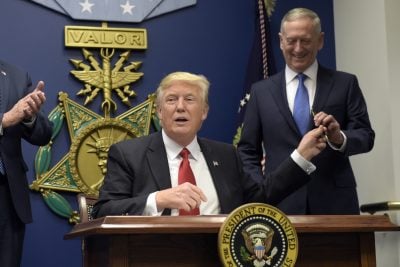NOVANEWS

Inflammatory rhetoric by Trump and Mattis risks turning a war of words into something much more serious. Miscalculations on both sides could lead to catastrophic war.
On Wednesday, Defense Secretary Mattis issued an ultimatum to North Korea, saying “cease any consideration of actions that would lead to the end of its regime and destruction of its people.”
His warning came in response to Pyongyang suggesting plans to fire ballistic missiles to within 30 – 40 km from Guam by mid-August.
On Thursday, Trump said his “fire and fury” warning perhaps wasn’t “tough enough.” The DPRK should “get (its) act together (or it’ll) be in trouble like few nations have ever been.” Its leadership should be “very, very nervous” if it does anything harmful to America or its allies.
Kim Jong-un “disrespected our country greatly. He’s not getting away with it.”
On Friday, China warned Washington, saying if it tries to forcefully topple North Korea’s government, it’ll intervene to stop it.
It repeated calls for calm and diplomatic outreach – easing tensions, not escalating them further. China’s People’s Daily said
“(a) way out of the nuclear issue on the Korean Peninsula cannot be found in the latest exchange of tough words between Washington and Pyongyang.”
“(T)he bottom line on the nuclear issue on the Korean Peninsula is that there must not be any armed conflict there. There is no room for any related party to play with fire on the issue.”
China’s Global Times (GT) said
“when…actions jeopardize (Beijing’s) interests, (it’ll) respond with a firm hand.”
GT repeated the warning issued in the People’s Daily, saying
“(i)f the US and South Korea carry out strikes and try to overthrow the North Korean regime and change the political pattern of the Korean Peninsula, China will prevent them from doing so.”
Beijing firmly opposes war on the Korean peninsula, threatening its national security. Its warning against the possibility is the strongest issued so far, a clear message telling Washington to back off.
Beijing won’t tolerate US East Asia aggression. It’s committed to regional peace and stability and will do whatever it takes to achieve these objectives – America’s meddling in a part of the world not its own the main obstacle.

Martin Schulz (Source: Wikimedia Commons)
German SPD head Martin Schulz, a candidate for chancellor in September federal elections, blasted Trump’s inflammatory rhetoric on North Korea, saying
“(w)e are in a situation when we need to tell the US government clearly that verbal saber rattling leads to the exacerbation of the conflict.”
“We need to use all channels to achieve de-escalation, to get the message across to the US president that his rhetoric is dangerous.”
Separately, China’s Defense Ministry warned Washington “to immediately correct its wrongdoing and stop provocations under the pretext of so-called ‘freedom of navigation,’ “ in response to a US guided-missile destroyer entering waters near China’s Nansha Islands without permission, adding:
“(S)uch provocative actions of the United States significantly hinder bilateral strategic trust, and also create difficulties and obstacles for enhancing relations between the armed forces of the two countries” – exacerbated by Beijing’s frustration over Washington’s tough talk on North Korea, risking war on the peninsula.
Regional conditions remain tense. Unthinkable nuclear war could follow by accident or design.



